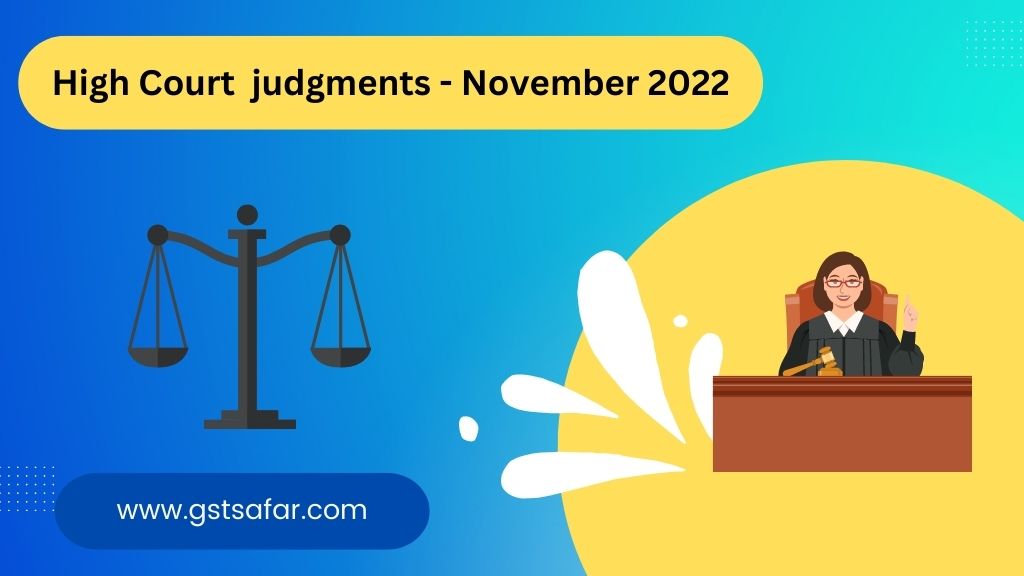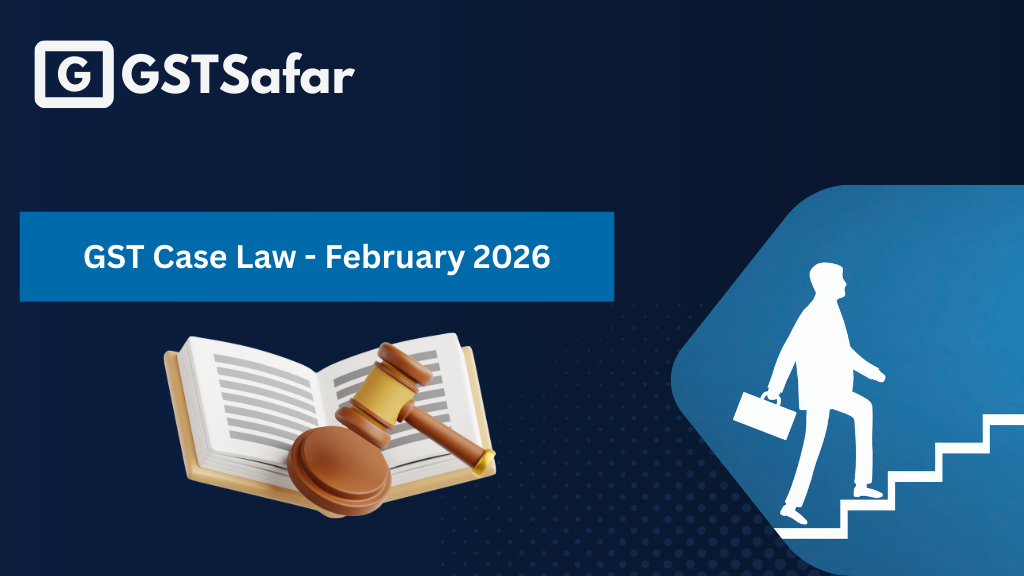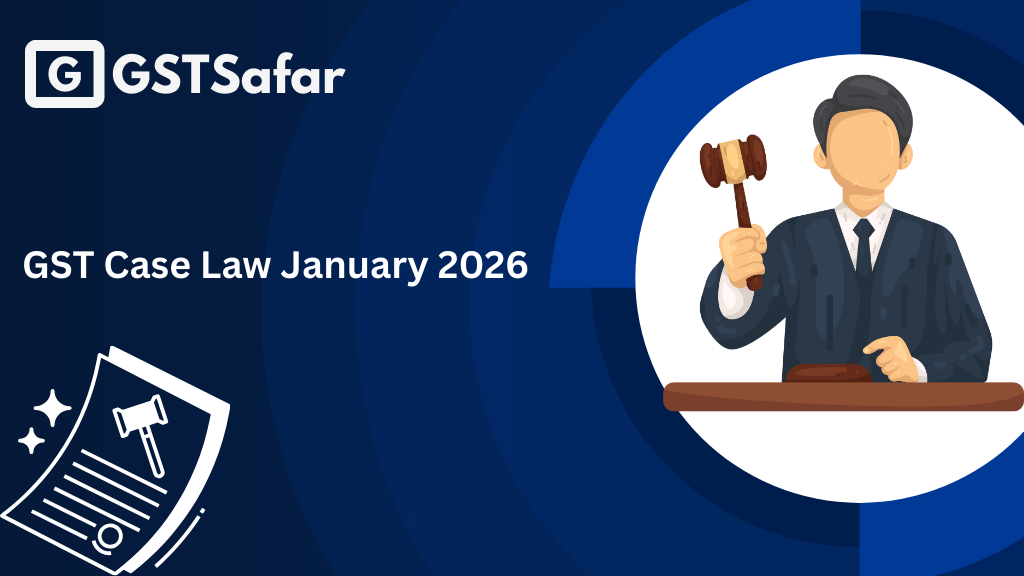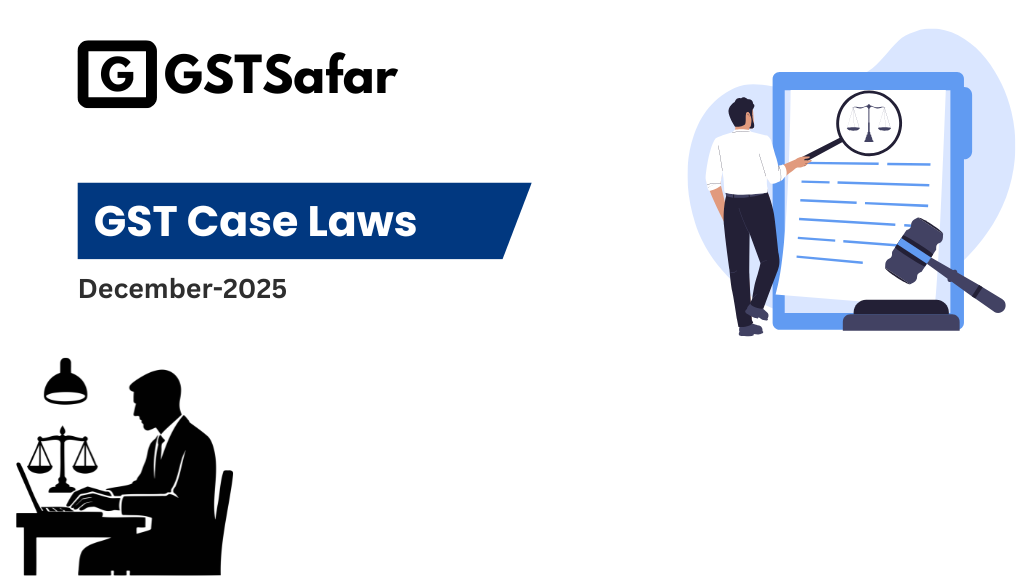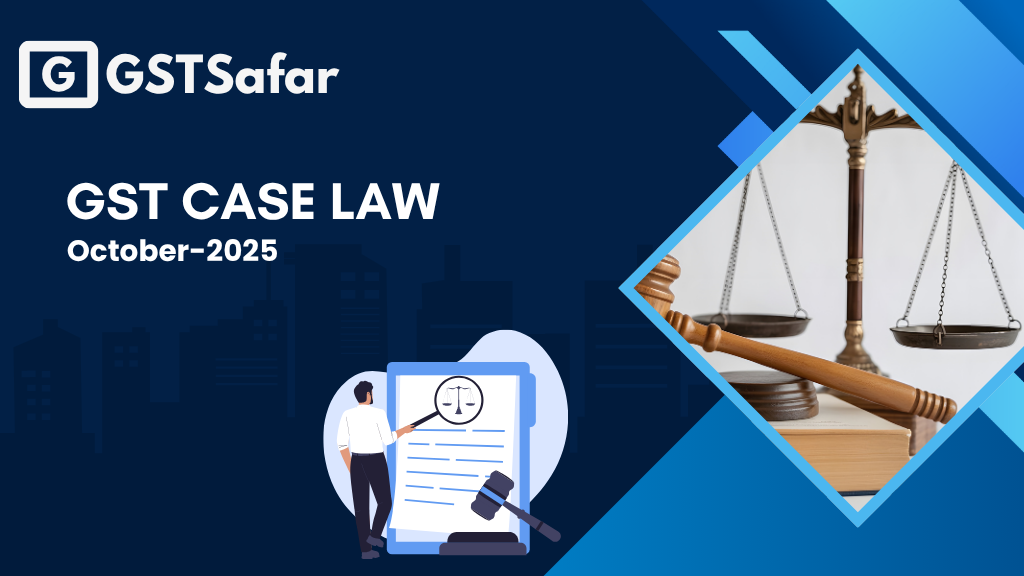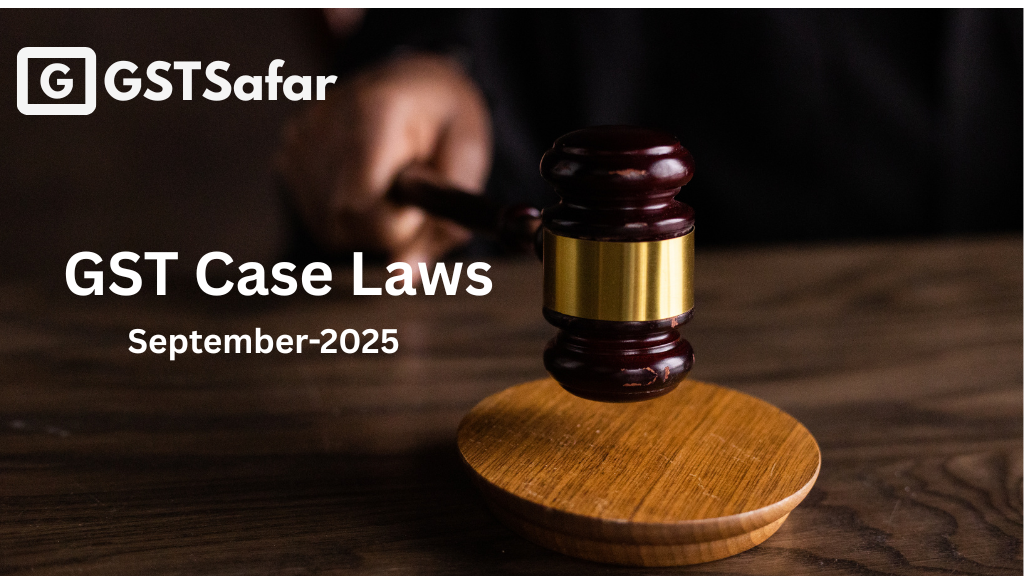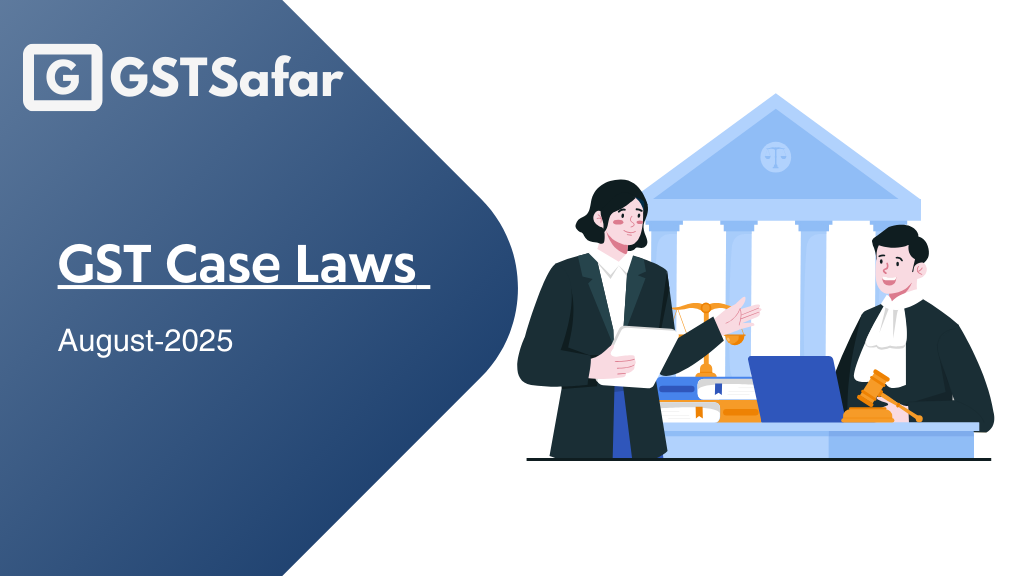The goal of this article is to cover all GST Case Laws issued by the High Courts and Supreme Courts in November 2022. All GST judgments presented in this article have been classified by name, date, judge, counsel, GST concept, GST section, etc. In addition, a PDF of the GST case law is provided with the case law so that the user can download it for further study.
Table of Contents
ToggleGST Case law related to registration and transitional credit
Bombay HC orders restoration of GST registration cancelled u/s 29(1) of CGST Act
| High Court: Bombay |
| Name of case : Euro Pratik Sales Corporation Vs Union of India |
| Date of Judgment : 17-11-2022 |
| Appeal No : Writ Petition No. 3380 of 2022 |
| Judges : K. R. SHRIRAM & A. S. DOCTOR, JJ. |
| Counsel Name : Mr. Shreyash J. Shah a/w. Mr. Udayan Mukherjee and Ms. Kavita Singh for petitioner. Mr. V.A. Sonpal a/w. Mrs. Jyoti Chavan, AGP and Mr. Himanshu B. Takke, AGP for State. |
| Fact of the Case: requesting the GSTN site be opened again so that the petitioner may submit an updated version of Form GST TRAN-1 – Transitional Credit |
| Held by court : The petitioner cannot be allowed to forego Rs. 39,13,025 in considered excise credit, especially as sub section 3 of Section 29 states that his liability will continue after registration cancellation. The petitioner should not lose the Rs. 39,13,025 presumed excise credit. Petitioners must comply by 4:30 p.m. submit a physical registration restoration request by November 18, 2022. Therefore, it was imperative for the Petitioner to be permitted to transit the credit to new GST regime. Hence, the High Court allowed Petitioner to submit physical application for restoration of GST registration. |
| In favor of : Assessee |
| Concept of GST : Registration |
| Section of GST : Section 29 and 30 of CGST Act |
GST Case law related to Refund
High court remanded back matter to AO in case of Rejection of GST refund towards E-rickshaw
| High Court: Calcutta |
| Name of case : R3 Enterprises And Anr Vs Deputy Commissioner of State Tax |
| Date of Judgment : 22-11-2022 |
| Appeal No : WPO/2789/2022 |
| Judges : MD. NIZAMUDDIN |
| Counsel Name : Mr. Dipayan Kundu, Mr. A. Ray, Ld. GP, Mr. T.M. Siddiqui, Mr. D. Ghosh, Mr. D. Saha, |
| Fact of the Case: This application has been filed in connection with the main writ petition to draw the court’s attention to a Circular dated 3rd August, 2022 being No. 179/11/2022-GST issued by the Government of India, Ministry of Finance. Relying on such Circular, petitioners submit that the impugned adjudication order and order of the Appellate Authority relating to Electric Vehicles is contrary to the Circular and petitioners are entitled to refund of the excess GST Mr. Ghosh, learned Advocate representing the State GST authority, submits that the State Government is going to issue the Circular in the similar line very soon and that the matter may be remanded back to the Adjudicating Authority concerned to consider the petitioners’ refund claim in light of the Circular dated 3rd August, 2022 |
| Held by court This writ petition, WPO 2789 of 2022, is disposed of by setting aside the impugned adjudication order and the appeal order and remanding the matter to the Adjudicating Authority concerned to pass a fresh order within eight weeks from the date of compulsion, taking into account the benefit given to the Assessee/petitioners in the aforesaid Circular dated 3rd August, 2022. |
| In favor of : |
| Concept of GST : Refund |
| Provision of GST : Circular 179/11/2022-GST dated 03.08.2022 |
GST Case law related to appeal and write petition
Writ petition was not maintainable at stage of show cause notice as GST law and rules made thereunder provide for sufficient safeguards for taxpayers by way of appeal
| High Court: Orissa |
| Name of case : Sri Muna Pani Vs State of Odisha |
| Date of Judgment : 18/11/2022 |
| Appeal No : W.P.(C) No. 20996 of 2022,20996 of 2022 |
| Judges : Jaswant Singh,MURAHARI SRI RAMAN |
| Counsel Name : Siddhartha Sinha,Anirudh Sanganeria,Lalatendu Samantaray,Sunil Mishra |
| Fact of the Case: On the basis of the mismatch between the figures provided in Form GSTR-3B and the data made available on WAMIS, a petition was filed to revoke SCNs granted for initiating proceedings (Works and Accounts Management Information System) |
| Held by court The adjudication process would have been halted if a writ petition had been entertained at the SCN stage because it would have violated established principles and given taxpayers insufficient protection through the ability to appeal an adjudication order because there was ample opportunity to raise concerns with the assessing officer at that time. The proper authority was free to rule on the matter in accordance with the law, and the determination of tax responsibility was within his or her purview. A Writ petition was to be dismissed at the stage of admission. |
| In favor of : Revenue |
| Concepts of GST : Appeals / Write Petition |
| Section of GST : Section 107 of Central Goods and Services Tax Act 2017/Odisha Goods and Services Tax Act, 2017 – |
| Indian Constitution : Article 226 of the Constitution |
GST Case law related to Import under EPCG and exemption of IGST on import.
Notification no. 79/2017-Customs granting IGST exemption to import of capital goods under EPCG is clarificatory
| High Court: Bombay |
| Name of case : Sanathan Textile (P.) Ltd. vs. Union of India |
| Date of Judgment : 14/11/2022 |
| Appeal No : Writ Petition No. 157 of 2019 |
| Judges : K.R. SHRIRAM,ARIF S. DOCTOR |
| Counsel Name : V. Raghuraman, Raghavendra, Shailesh Sheth, Prabhakar K. Shetty, J. B. Mishra, Anjani Kumar Singh, Ram Ochani |
| Fact of the Case: Petitioner contended that as per Notification No. 16/2015-Cus dated 1-04-2015 goods covered by valid authorization issued under EPCG Scheme were exempted from whole of additional duty leviable under Section 3 of Customs Tariff Act but when GST regime came into force said notification was amended vide Notification No. 26/2017-Cus dated 29- 06-2017 and import under EPCG Scheme which was exempted from additional duty under Section 3(7) and 3(9) was not included – However, Notification No.16/2015-Cus was again amended amended on 13- 10-2022 and said sections were included and importer was entitled for exemption – Whether petitioner would be entitled for exemption from additional duty under Section 3(7) and 3(9) during period 1-7- 2017 to 13-10-2017 |
| Held by Court: Where as per notification No 16/2015-Cus, capital goods covered by valid authorization under EPCG Scheme were exempted from any additional duty leviable but when GST regime came to force said exemption of import under EPCG Scheme which was exempted from additional duty under Section 3(7) and 3(9) was not included, however, notification no.16/2015-Cus was again amended on 13-10-2022 and said sections were included and therefore notification No.16/2015-Cus dated 1-04-2015 was clarificatory/curative in nature, and petitioner would be entitled to refund of the IGST paid by petitioner during 1-7-2017 to 13-10-2017 |
| Analysis That the payment of additional tax under Section 3 of the Customs Tariff Act was never the Central Government’s purpose with regard to importation of capital goods under the EPCG Scheme. Remember that when the GST system was implemented, Notification No. 16/2015-Cus, which was the relevant adjustment, changed Section 3 of the Customs Tariff Act by inserting Sub Sections (7) and (9) that provided for the levy of Integrated Tax and Goods and Service Compensation Cess. Vide The Subsections (7) and (9) of Section 3 were omitted from Notification No. 26/2017-Cus, dated June 29, 2017. However, Notification No.16/2015-Cus was later further revised on October 13, 2017, and imports were subject to the EPCG shortly after that.After further amendments, Notification No.16/2015-Cus has been changed to exempt imports made under the EPCG Scheme from additional duty under Sub-Sections (7) and (9) of Section 3 of the Customs Tariff Act. Owing to the fact that it would otherwise leave a whole class of importers who had imported capital goods uncovered during the period of 1 July 2017 to 13 October 2017 and allow the Department to levy additional duty under Sub Sections (7) and (9) of the Customs Tariff Act on such imports, despite the fact that the Foreign Trade Policy 2 necessitates the Department to levy additional duty under Sub Sections (7) and (9) of the Customs Tariff Act on such imports, in our opinion |
| In favor of : Assessee |
| Concept of GST : Refund, EPCG, |
| Relevant Law : Notification No 16/2015 -Customs |
GST Case law related to Offences and Penalties
Due to the investigative agency’s failure to present any pre-charge evidence, bail was granted in the GST evasion case.
| High Court: Punjab & Haryana |
| Name of case : Rajan Arora vs. State of Punjab |
| Date of Judgment : 14-11-2022 |
| Appeal No : CRM-M no. 22778 of 2022 |
| Judges : Pankaj Jain |
| Counsel Name : H.S. Brar, J.S. Bedi, Sumeetpal Singh Sidhu,Arun Gupta |
| Fact of the Case: By connecting a network of 16 businesses that dealt in iron and steel scrap or supplied manufactured goods, the petitioner-assessee was accused of evading taxes. The petitioner was sentenced to six months in prison, with the maximum penalty under section 74 being five years. |
| Held by Court: Petitioner was to be released on regular bail on such furnishing bail or surety bonds under the terms of Section 132 read with Section 74 of the Central Goods and Services Tax Act, 2017/Punjab Goods and Services Tax Act, 2017 because the department had failed to present pre-charge evidence for six months. |
| In favor of : Assessee |
| Concept of GST : Offences and Penalties |
| Section of GST : 132 of CGST Act 2017 read with Section 74 of CGST Act 2017 |
GST Case law related to intermediary service
Scope & ambit of intermediary service is same under service tax & GST regime
| High Court: Punjab & Haryana |
| Name of case : Genpact India (P.) Ltd. vs. Union of India |
| Date of Judgment : 11-11-2022 |
| Appeal No : CWP-6048-2021 (O&M) |
| Judges : TEJINDER SINGH DHINDSA, DEEPAK MANCHANDA |
| Counsel Name : TEJINDER SINGH DHINDSA, DEEPAK MANCHANDA |
| Fact of the Case: Petitioner is a Business Process Outsourcing (BPO) Service Provider located in India – Petitioner entered into a Master Services Sub-Contracting with Genpact International Incorporated (GI) located outside India – The order dated 15.02.2021 issued by the Additional Commissioner CGST (Appeals) Gurugram is being contested. In that order, it was determined that the petitioner’s services fall under the category of “Intermediary Services” as defined by Section 2 (13) of the IGST Act and do not qualify as “export of services” as defined by Section 2(6) of the Act, rejecting the claim for a refund of the unused Input Tax Credit (ITC) used to make zero-rated supplies |
| Held by Court: There doesn’t appear to be any distinction between the meaning of the term “intermediary” under the GST regime and the pre-GST regime; the MSA entered between the petitioner and GI was clearly for the purpose of GI subcontracting services to the petitioner; it does not in any way suggest that the petitioner is acting as a “intermediary” so as to fall within the scope and ambit of the definition of “intermediary” under Section 2 (13) of the IGST Act. It was clear that the petitioner was doing services for which GI had subcontracted to it. The main contractor, GI, is also getting commissions or agents from its clients for the primary services that the petitioner is performing under the terms of the subcontracting arrangement. Respondent-department erred in holding that petitioner was in a principal agent relationship with GI – Petitioner was not a “intermediary” and the impugned order cancelling the GST refund was to be quashed because no evidence had been presented to demonstrate that petitioner had a direct contract with customers of GI or that petitioner was liaising with or acting as a “intermediary” between GI and its Customers. |
| In favor of : Assessee |
| Concept of GST : Intermediary Services |
| Section of GST : Section 2 (13) of the IGST Act |
GST Case law related to Transitional Credit
SCN under Section 73 for the verification of a transitional credit cannot be issued by GST authority.
| High Court: Jharkhand |
| Name of case : Usha Martin Ltd. vs. Additional Commissioner, Central GST and Excise |
| Date of Judgment : 10-11-2022 |
| Appeal No : W.P.(T) No. 3055 of 2022,3055 of 2022 |
| Judges : APARESH KUMAR SINGH, Deepak Roshan |
| Counsel Name : Sujit Ghosh, Joybrata Misra, Ashray Behura, Shubham Gautam, Amit Kumar, Ashish Kr. Shekhar, Prabhat Kr. Sinha |
| Fact of the Case: M/s Usha Martin Ltd. (“the Petitioner”) manufactures iron and steel products and was registered under the erstwhile tax laws of the Central Excise Act of 1944 (“the Excise Act”) and the Finance Act of 1994 (“the Finance Act”). The petitioner enrolled under GST after July 1, 2017. By submitting GST TRAN-1, the Petitioner carries forward CENVAT credit under the GST system. The Respondent issued the SCN and claimed that, as of March 30, 2022, the Excise Act, Finance Act, and Cenvat Credit Rules, 2004 (“CCR”) were being violated by the Petitioner’s attempt to substitute CENVAT credit for invoices created by a company under the existing tax system. After that, the Respondent denied the CENVAT credit via Order-In-Original dated March 30, 2022 (“the Order”). |
| Held by Court: The High Court found that provision 73 of the CGST Act makes it plain that proceedings under this section can only be initiated for failing to pay any taxes, paying them in part, receiving an incorrect tax refund, or improperly claiming an input tax credit that is allowed by the CGST Act. A notice about CENVAT credit cannot be issued by an adjudicating authority under Section 73 of the CGST Act. Therefore, according to the law, it was improper to invoke Section 73 in this particular circumstance. Therefore, the Respondent’s initiation of a charge under Section 73 (1) of the CGST Act for violating the Excise Act and the Finance Act was outside the purview of the authorities. As a result, the High Court quashed the Respondent’s Order for lack of jurisdiction. |
| In favor of : Assessee |
| Concept of GST : Demands and Recovery/Transitional Credit |
| Section of GST : Section 73 of CGST Act 2017 |
GST Case law related to Works contract service commenced before 1st July, 2017
Differential Tax Amount for works contract service- Authority directed to look into the matter in light of guidelines issued by State Government.
| High Court: Orissa |
| Name of case : Bhanjadeo Constructions Vs State of Odisha & Others |
| Date of Judgment : 09/11/2022 |
| Appeal No : W.P.(C) No.38497 of 2021 |
| Judges : M. S. Raman |
| Counsel Name : For the Petitioner : Mr. Prabodha Chandra Nayak, Advocate For the respondent : Mr. Debakanta Mohanty, Addl. Govt. Advocate |
| Fact of the Case: Reimbursement of differential tax amount arising out of change 2 in tax regime from Value Added Tax (VAT) to Goods and Service Tax (GST) with effect from 1st July, 2017 – problem faced by contractors due to change in regime regarding works contract under GST. M/s. Bhanjadeo Constructions (“the Petitioner”) challenged the decision of Respondent to withhold payment of the differential tax amount resulting from the change in tax regime, i.e. from VAT into the GST which took place on July 1, 2017. |
| Held by court: The High Court recognised that Office Memorandum No. FIN-CTI-TAX-0045-2017/38535/F dated December 10, 2018 (“Revised Guidelines”) suppressed Finance Department letter dated December 7, 2017 regarding work contracts. In order to comply with GST work contract regulations, the State Government has updated the Schedule of Rates-2014 (“Revised SoR-2014”) via Work Department OM No. 13827/WD. Thus, when estimating a work after July 1, 2017, the GST-exclusive work value must be calculated according to the amended SoR-2014 and GST added at the appropriate rate. The contractor must issue Tax Invoices with the taxable work value and GST (CGST+SGST) separately under GST. Work where the tender was called before July 1, 2017 on the basis of SoR-2014 but payment made for the balance work or full work after GST implementation must follow the new guidelines. The Court directed the authorities to review and dispose of the Petitioner’s full representation in light of the State Government’s updated instructions. If the Petitioner disagrees with the authority’s judgement, they can appeal to the Court. |
| In favor of : Assesee |
| Concept of GST : Works Contract |
| Section of GST : |
GST Case law related to Detention, Seizure, release of goods and conveyance in transit
High Court modifies earlier order and directs release of confiscated goods and conveyance confiscated subject to payment of 25% of redemption fine
| High Court: Andhra Pradesh |
| Name of case : Sun Traders vs. Deputy Assistant Commissioner, Circle-I |
| Date of Judgment : 04-11/2022 |
| Appeal No : W.P. No. 15445 of 2022,15445 of 2022 |
| Judges : Dr. KMR,TRR |
| Counsel Name : |
| Fact of the Case: An previous order stayed the confiscation order subject to payment of 50% of the redemption fine. The current application seeks to alter the stay order taking into account the deemed stay available at the time of filing the appeal, subject to 10% of the disputed amount. |
| Held by Court: Following an earlier order in a similar matter, the stay order is modified to the extent that the goods and conveyance would be released subject to payment of a 25% redemption fine. |
| In favor of : Assessee |
| Concept of GST : Offences and Penalties/Detention, Seizure, release of goods and conveyance in transit |
| Section of GST : Section 129 read with Section 107 of Central Goods and Services Tax Act, 2017 |
GST Case law related to Registration
Delhi High Court
It wasn’t fair to cancel GST registration based on a physical check at the business location without notifying the taxpayer and without posting a verification report to the common portal.
| High Court: Delhi |
| Name of case : Bimal Kothari vs. Assistant Commissioner (DSGST) |
| Date of Judgment : 01-11-2022 |
| Appeal No : W.P.(C) no. 9207 of 2019 CM No. 37947 of 2019,9207 of 2019,37947 of 2019 |
| Judges : RAJIV SHAKDHER,MS. TARA VITASTA GANJU |
| Counsel Name : Boudhayan Bhattacharya, Anshul Narayan, Harpreet Singh, Shourya Dasgupta, Ms. Suhani Mathur, Jivesh Kumar Tiwari, Ms. Samiksha |
| Fact of the Case: After carrying out physical verification of the place of business, the registration certificate was cancelled on the grounds that business was not being carried out from the registered place of business. – Assessee had submitted application notifying change of place of business, which was also highlighted in reply to notice. |
| Held by court : :Although registration was revoked after physical verification of the place of business, the Proper Officer failed to issue a notice to the assessee mandating his presence at the time of verification in accordance with Rule 25. After physical verification, Form GST REG-30 was not uploaded to the common portal within 15 days of the date of such verification – Order cancelling registration was not sustainable – Department was to be directed to restore registration and give assessee eight weeks to file returns for period he registration was cancelled. |
| In favor of : Assessee |
| Concept of GST : Registration |
| Section of GST : Section 29 of CGST Act 2017 |
Bombay High Court
Under Section 29(1) of the CGST Act, the Bombay High Court says that a GST registration that was canceled should be brought back.
| High Court: Bombay- |
| Name of case : Euro Pratik Sales Corporation Vs Union of India |
| Date of Judgment : 17-11-2022 |
| Appeal No : Writ Petition No. 3380 of 2022 |
| Judges : K. R. SHRIRAM & A. S. DOCTOR, JJ. |
| Counsel Name : For Petitioner: Mr. Shreyash J. Shah a/w. Mr. Udayan Mukherjee and Ms. Kavita Singh For State : Mr. V.A. Sonpal a/w. Mrs. Jyoti Chavan, AGP and Mr. Himanshu B. Takke, AGP for State |
| Fact of the Case: The GST Law required M/s Euro Pratik Sales Corporation (“the Petitioner”) to register. The petitioner close down his company and asked to have his GST registration cancelled; he was eventually successful. The petitioner had deemed excise credit of Rs. 39 Lakhs at the time the GST registration was cancelled. Though the Petitioner was eligible to claim transitional credit in GST, however, could not transit the credit because the Petitioner’s registration was cancelled. The Central Goods and Services Tax Act, 2017 (the “CGST Act”), Section 30, states that the proper officer must have acted independently when cancelling a registration in order for it to be revoked. The petitioner suo moto submitted an application for registration cancellation in the current matter. It was noted that there was no mechanism for cancellation in such a situation in the GST law. The petitioner requested permission from the High Court to submit GST TRAN-1 either manually or electronically. |
| Held by court Given that Section 29(3) of the CGST Act states that cancellation of the registration does not affect the taxpayer’s obligation to pay any tax, dues for any period including prior to the date of cancellation whether or not such dues are determined before or after the date of cancellation It was not acceptable to allow the petitioner to forgo a sum of Rs. 39 Lakhs to which it claimed it was entitled as credit under GST law. Therefore, the Petitioner’s request for permission to transfer the credit to the new GST regime was essential. As a result, the High Court permitted the Petitioner to physically submit an application for the restoration of GST registration. |
| In favor of : Assessee |
| Concept of GST : Registration |
| Section of GST : Section 29 of CGST Act 2017 |
GST Case law related to arrest
The High Court ordered the investigating officer to follow Sections 41 and 41A of the Code of Criminal Procedure, 1973, before arresting the assessee on a summons under Section 70 of the CGST Act, 2017.
| High Court: Allahabad |
| Name of case : Prashant Sharma vs. Union of India |
| Date of Judgment : 01-11-2022 |
| Appeal No : BAIL APPLICATION No. 8218 of 2022 |
| Judges : Suresh Kumar Gupta |
| Counsel Name : Mohd. Afzal, Sudarshan Singh |
| Fact of the Case: In conjunction with the notice issued under Section 70 of the CGST Act, 2017, an anticipatory bail application had been made, anticipating arrest. |
| Judgment Before making an arrest of an assessee in response to a summons issued under Section 70 of the CGST Act, 2017, the High Court instructed the investigating officer to ensure that sections 41 and 41A of the Code of Criminal Procedure, 1973 were complied with. |
| In favor of : Assessee |
| Concept of GST : INSPECTION, SEARCH, SEIZURE AND ARREST |
| Section of GST : Section 70 of CGST Act 2017 |
FAQS
What are the court Judgements on GST Penalty?
As per Punjab Haryana high court in case of Rajan Arora vs. State of Punjab court held that Petitioner was to be released on regular bail on such furnishing bail or surety bonds under the terms of Section 132 read with Section 74 of the Central Goods and Services Tax Act, 2017/Punjab Goods and Services Tax Act, 2017 because the department had failed to present pre-charge evidence for six months
